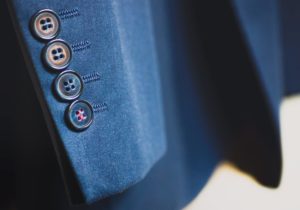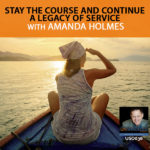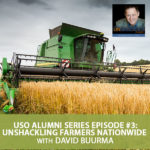
Matthew Pillmore is the founder and CEO of VIP Financial Education, a 17-year-old company that’s helping people take the banks’ products and turn them back around against the bank so that you can eliminate personal debt faster. He goes into detail about these wealth weapons that everyone, not just entrepreneurs, could be benefited by.
Listen To The Episode Here
Wealth Weapons That Eliminate Debt Fast – Interview with Matthew Pillmore
Hello, everyone. Welcome to The Unshackled Owner podcast. I’m Aaron Young. This is episode number fourteen of the podcast where we’re showing you how to build a business that works harder for you then you have to work for it. A business is not just a glorified job. It’s a real asset, something that you can sell, something you can leverage, something you can really get real value out of, one that you can own without it owning you. The whole idea behind The Unshackled Owner, the concept is you can run a business but then you can also have a life. This is what I found as I’ve talked to so many business owners over the years as I’ve built companies, too many business owners are owned by their business. This is the place, we’re talking to successful, smart, awesome people, hearing what they’re doing in their business to be less and less shackled, and how they’re figuring out how they can make real wealth without just being the most critical employee in their business.
We got a great guest today, a good friend of mine, his name is Matthew Pillmore. He is the founder of VIP Financial Education. This is their seventeenth year in business. That sets them apart from the crowd right there. Not only are they seventeen years old. We’re going to hear more about Matt’s stories as we get into this. I’ll just tell you, this is a guy who came in and saw opportunity and took advantage of opportunity. It has ended up becoming a great thing not only for him but for tons and tons, thousands of clients. Anyway, Matt, welcome to the podcast. I’m so glad to have you here.
Aaron, it’s always a pleasure. Nice speaking with you. Thank you for having me.
It’s great. What I’d love to do, and I’m just going to let you opine here for a minute, I’d love it if you would just tell us, how did you get started? I know you’re young, you’re a pretty young guy now and you’ve been in business for seventeen years. Tell us how that started and how you went from the beginning of VIP to being the master and commander of that ship.

Wealth Weapons: I was hooked on being my own boss.
I’ll try and give you the fast track life story. I’ve really been an entrepreneur my whole life. I can remember back when I was nine years old selling cold soda on the golf course in my local town in Colorado. I would make hundreds of dollars a month. We’d set up really strategically on a public course where there was no drink caddy, and we would sit on the seventh hole where people were just parched. It worked out really well. From that point on, I was hooked on being my own boss.
Is this a disruptive thing? Did you have permission to be there? Did you carry a cooler on there? Like little kids walking up there with a cooler and like setting up a lemonade stand on the seventh hole. How did that work?
I don’t think we were really allowed to be there, although we did really sit on the course, we were sitting on the shoulder of the road so they couldn’t do much about it. We were out there all summer. It was myself and my brothers. We made a fortune. We started this company called JAMS. It was an acronym for John, Adam and Matt, our three names. Our parents were in full support. We would set aside the money, it would go on to an envelope and we would use that money every year to afford various weekend getaways and trips with the family, things that we wanted to purchase as kids. It was awesome being able to control basically our own destiny when it came to finances even at that age. It was something that we could definitely appreciate.
It’s a disruptive marketing, disruptive marketer right there. “No, we’re not quite on the course.” If you wonder why your beer sales are down, it’s because these cute little kids are sitting here, selling Diet Coke.
That’s true, it worked. I was the cutest of course. It never hurt to have those good looks as a kid. We sold a lot of soda. It’s funny because then as I started getting older, I did the full routine. At thirteen, I had a paper route, very much my own boss doing that too. But gradually becoming more of a W2 wager, I got a traditional job in the mall at sixteen in a Chinese restaurant. From there, it was everything from pizza delivery, to warehouses, to retail work. I just couldn’t stay way with a job. I just struggle working for other people.

Wealth Weapons: One thing I was always great at was solving problems, and that translated into a knack for sales.
One thing I was always great at was solving problems, and that translated into a knack for sales. If I could find things that I really believed in, whether it would be cut cold knives or selling shoes, I was really good at it. Eventually, that led to a role in the Promotions Department with ADT Security Systems. I worked my way up quickly there to where at the age twenty, while still attending school, I was earning $100,000 a year. It was also a canvassing position. If you’ve ever knocked door to door, that is some tough work. It wears you down.
Do you know how many people I’ve met that are successful entrepreneurs that did some hardcore door knocking, commission sales deal? It’s the hardest frontlines of business, but there is something about that crucible that really brings out that entrepreneurial spirit. People that have a silver spoon or an easy path, they’ll fall right into that W2 job, they’ll never understand it. People will think entrepreneurism is easy, you’re wrong, because most of the men and women that are successful started off in the hardest grunt work. I tell you, knocking doors is tough, but if you’re good at it, you can make a boat load of money. A lot of our guests have done door to door work. It’s amazing that that’s a repeated theme in really successful business owners. Anyway, go ahead, Matt.
I wouldn’t trade it for the world. I honestly think it’s one of the things that really can help groom you into much thicker skin. You’re contending with everything, all the elements, the weather. I started in September, through the winter. It was one of these really hardcore boiler room style door to door positions. We came in to the office every morning at 7:30. We had a two-hour meeting and we would just get yelled and cussed at for two hours, Monday through Friday. Their motto was, “Your pat on your back is your paycheck,” because we made a lot of money. At twenty years old, a $100,000 feels like a fortune. It really does.
Almost everybody in the world would consider $100,000 a year a fortune. At twenty years old, we’re going back seventeen, eighteen years, or whatever, Matt, that was a lot of money.
I know. I was cashing $2,000 paychecks. Because I was knocking door to door, I stumbled quite literally into the opportunity to start VIP. Ultimately, I was offered a position through somebody that I knocked on his door. I was out on a Sunday. Listen, if you can knock doors, you can do anything. The mortgage industry happened to be scorching hot in 2000. He said, “Look, you can come in, and without knowing anything about it, make $60,000, $70,000.” I said, “That’s all right, I’m good.” A month later, I’d had enough. I was tired at getting yelled at. It just wasn’t the morale building type of business model that I tried to create. I handed them back their shirts. I went back to this guy, his name ironically was Larry King. I’ll never forget that, obviously. I said, “Larry, are you still willing to train me?” As embarrassing as it is to think back now, I didn’t even know what a mortgage was.
You’re twenty years old. You’re not supposed to know.
That’s true. I feel now that people should know. Unfortunately our school system deprives us of that education, but you’re right. We don’t learn growing up what that is technically. We have an idea. I was trained from the ground up at twenty. I accepted the role as one of the founders of America’s Mortgage, and came in doing wholesale residential mostly. It was obviously a cut throat business at that point, with everybody trying to make a fortune selling subprime lending. I never subscribed to that. For that reason, I really had to learn how to work hard early on.
Now, in order to separate ourselves from our competition, we started VIP Financial Education as a complimentary curriculum of fairly traditional real estate related topics. We would just teach in the general Denver Metro area to what started out as small audiences and then overtime it grew. We were actually quite surprised by the eventual popularity of this curriculum to where it inspired us. In year 2001, 2002, a year or two in, we said it would really be a good idea to become the authority on a specific subject and just start to be known as the leading experts on that. For us, we were really inspired by the mystery of credit. Credit was something that we knew was playing an enormous role in these loans that we were processing. We just never really saw anyone ripping back each layer of the algorithm to expose it publicly.
Tell us, what is it that you learned? What do most people think? In a nutshell, what’s the bumper sticker here on what most of us think of as credit, but what you actually know as credit, and what you’re trying to expose?

Wealth Weapons: I’d never had any additional information regarding credit until learning that there’s this underlying underwriting guideline that means everything.
At that point in time, I sought out the leader in the industry. His name is John Ulzheimer. He is one of the original creators of the Fair Isaac Credit Scoring Algorithm known as FICO. This is the score all the banks use. What surprised me most was through my lifetime, as an under-educated consumer, as we all are, I was taught by parents who by all standards would be considered living the American dream. My dad worked at home my whole life as a self-employed CPA. My mom worked two days a week as a travel agent. To get great credit, I was taught you had to pay your bills on time. That was it. Make sure you have some credit and then make sure it’s paid as agreed. That’s it. I’d never had any additional information regarding credit. Until coming in and learning that there’s this underlying underwriting guideline that means everything.
It not only is affecting the ability to get new lending, but it’s also affecting the cost every month to live, whether it would be through interest rates or insurance premiums. Even if I never wanted to borrow another day in my life, my insurance is affected. My ability to rent places is affected. My ability to get a specific job is affected. Credit seemed really important, even in 2000 and it’s only gotten more so.
What I’ve learned now is there’s so much more beyond paying your bills on time. In fact, that’s worth only 35% of your credit score. 65%, two thirds of the score is determined by four other ingredients that we never really hear much about. Overtime, through just school of hard knock, we tend to pick up on some of these details like how much we’re using of what’s available to us. What most people fail to understand is just how much power and control they have through a very small amount of pro-action each month on their, not just credit scores but overall credit profiles.
Go a little deeper there. This is like you’re dangling this wonderful treat in front of us. We know, pay your bills on time. You have to have some credit, pay your bills on time. It has something to do with what percentage of it. In other words, if I had two credit cards, one was maxed out and one was zero, that hurts my score rather than having both of them at 40%, I’m using partial on two. Isn’t that correct? You should never be maxed out.
There is some juggling that you can do to manipulate the aggregated totals to balance out those ratios and see some impact. I like other strategies a little bit better. The debt to available ratio, not to be confused with debt to income, is a huge factor. It’s worth 30% of the score, so almost as much as whether or not you pay your bills on time. The truth is, every percentage point reduction to that ratio is an improvement or considered a positive impact to your credit scores and profile. Every percentage point increased to that ratio is considered negative to your credit score.
What does that mean?
Everybody hears these various milestones being discussed, whether it’s you’ve got to keep your balances below 50% of your available or 30% or 10%. While these benchmarks I think are useful to set target goals around, the truth is 18% is better than 20%, and 15% is better 18%. Paying your balances on revolving credit cards every month in full is the objective that you need to be working toward.
Really? Pay it off every month?
Pay it off in full every month. Not only is that the most positively influential to the scores, but it obviously impacts your debt to income ratios more favorably and you don’t pay any interest on credit cards when you pay them in full every month, even if it’s a 30% interest credit card. We’re using credit cards daily for everything that we’ve already planned on spending money for, but we just pay that balance in full before it’s due every month. We do that in order to collect the rewards.
Got it. That’s interesting. You’re learning all this stuff, you’re a young kid, and you start to find out that a lot of people want to learn this stuff. How did you go from being a way of augmenting, I guess what it was is differentiating yourself from the market by becoming more useful to your prospective borrowers. How did you go from that to jumping it up to where you are now? I need to know this, as you were going along that path, did you ever slam into a wall and go, “Something has utterly changed and I have to go figure out how to innovate around it”?
Yes, absolutely, without question, many walls. What that initial introduction to some of these pioneers did for us was landed me the FICO certification. I was actually the youngest certified FICO expert in the country at the age of 23. By 25, I was seasoned at traveling and speaking, talking on various media outlets. I was doing dozens of guest radio appearances each month and a handful of television segments just talking about credit.

Wealth Weapons: If I could go back and do anything over again, it would be learning to be more humble early.
Along the way, just through that ambition and hustle, I stumbled into what we now are best known for, which is this cashflow optimization strategy. It’s this collection of everything that we were getting well-known for and becoming specialized in previous to learning this, and then it suddenly just wrapped all that up and packaged into this amazing capability to almost rewrite the rules against the banks. The very first time I heard that it was possible to utilize specialty credit in order to manipulate the way that we were borrowing and leveraging for business expansion or for real estate investing, I just shrugged it off. I can think back now and my initial reaction to it was, “I’ve been in the lending world now for half a dozen years, if this were real I would have heard about it.”
You asked about the walls. What really were the walls that slowed me down, tested me? There were a couple of things. First of all, if I could go back and do anything over again, it would be learning to be more humble early, accepting that you don’t know what you don’t know.
Everybody, listen to that. I tell you what, that’s what I would go back too. If you’re successful at a young age, you think that you’ve got this suit of armor on and nothing can hurt you. You know you’ve got it going on. That humility issue is the single biggest chink in your armor. If you’re not humble, you’re going to miss out on opportunities. If you think by 25 or 30 or by 50 that you know it all, then you’re going to limit your ability to really make true wealth, because it’s always changing. I wanted to stop on that one for a minute and take it in. We blow off things that we don’t understand. We ignore them to our own detriment.
That’s right. It’s embarrassing to think back on that today because that level of arrogance, I know it cost me a fortune. I know for a fact it did. I just struggled admitting that I needed help. I was always that natural DIYer. It wasn’t until 2009 when I finally had to admit to myself that I had made a $180,000 mistake. There a lot of people around me that make much bigger mistakes and a lot of people that are shocked that I could make a mistake so large. Nonetheless, it was one that I could have avoided if I was willing to admit that other people know more than I do. That frankly, when I’m in the midst of some of the most important decisions professionally and personally, my emotions are going to get in the way.
I’ve learned over the years that emotional decision making is rarely the same thing as rational decision making, if ever. I’ve learned since that time to more often than not ask for help. I surround myself with people like you, as many great and successful people as I can. People who I admire, people who I look at and say, “I just want to emulate that person.” I think that’s what it’s all about. I just don’t think that there’s all that much. There’s not all that many new things being invented anymore. I think you just need to find the stuff that you can really stand behind that really is a clear cut perception of you, and just emulate and improve where you see there are weaknesses. You don’t have to reinvent any wheels. It’s just a matter of improving and polishing the wheels that are out there.
Unshackled listeners, remember this. A lot of times the walls we slam into in our business are walls of our own making. Often, that is out of ignorance. Most of our ignorance comes out of a lack of humility. It’s this feeling of, we have to do it ourselves, we’re the smartest person in the room. Or we’re embarrassed that we’re going to get judged because we don’t know something. So instead of asking questions, instead of seeking help, mentorship, education of some books, events, roundtables, whatever it is, go out there and always be exploring.
I was just listening to Daymond John today. He was saying that it doesn’t matter how successful he is, it doesn’t matter that he’s had eight seasons of Shark Tank. He said, “The more I’m out there in the business world, the more I realize how much I don’t know and how fast the industries or the world is iterating. I’ve got to be out there on the cutting edge of what’s going on.” If you feel like you’ve got it all figured out, working from your kitchen table or you’ve got 10 employees and you’re making money, I promise you, if you don’t adapt to what’s changing in the world and learn the best practices from the best people, you will eventually get left behind. That’s where it’s going.
We just heard that a lot of times the wall that you slam into and then you go, “How the heck did I slam into it?” is a wall you built, custom made for you to crush your nose into. I have to ask you about one more thing and we’re going to go back and talk about how you’ve built your business a little bit more with people and so on. You mentioned it, and I know from being a customer of yours that you have something you called debt weapons. That’s something I was completely unaware of until I heard you speak. Just dangle it out there for everybody to know, what is a debt weapon and how do you use the bank’s products against the bank?

Wealth Weapons: There are so many different better ways of borrowing than what we are often led to when we approach banks for loans.
That’s a great question. What we finally mathematically concluded was there were so many different better ways of borrowing than what we are often led to when we approach banks for loans. Again, unfortunately, this is an area of deprivation educationally. Most of us are very passive when we borrow. We just accept the terms and everybody gets into thirty year mortgages and we get these credit cards and auto loans. We just pay throughout, pay every month. Frankly, a lot of that is the traditional definition of fiscal responsibilities. It’s not even doing something wrong in the eyes of our society. But when you look at the math and you look at the total cost of, say owning a home and paying it off over the course of 30 years, even with historic low interest rates, the total costs are nauseating at best.
Huge expense.
Again, it was first introduced to me back in 2005, I shrugged it off. Six months later, I’d heard about it another several times that there were possible ways of flipping the script on the banks using their own products, turning the banks against each other. At that point, I started to second guess my behavior and said, “If this is real, what kind of an expert can I claim to be if I don’t know about it?” I just built spreadsheets, we just started to figure it out with the arithmetic. When you look at two plus two, it doesn’t matter how much conceptualization somebody else is out there trying to sell. I didn’t want that. I felt like somebody was trying to take advantage of me. I just wanted to see the dollars and cents. It was a lot of late nights. I just remembered one night at 4:00 AM lying in bed and it was one of those eureka moments, the a-ha. It hit me like a ton of bricks, “What the hell man? This is available?”
What is it?
What it is? It’s a way of using various lending products to essentially apply lumpsum amounts towards mortgages and other non-mortgage related debts. Frankly, it works on any debt at all. We were able to just leap frog down amortization and revolving compound interest scales so that these schedules could be literally chopped in little pieces to where we’re paying 30 year loans off in six, seven, eight, nine sometimes ten years. We’re 30 year loans, cutting them by two-thirds, sometimes three quarters.
Does it mean I have to make much larger payments? In other words, you have to have a lot more cashflow in order to do that?
It works with the exact same cashflow that people have starting off going in. It’s just a matter of how that cashflow is managed each month. We do it by recognizing that checking and savings accounts are garbage. There are reasons why we use them. First of all, we’re taught to, but nobody really knows why. I could ask a room of a thousand people how many people in here use checking and savings and every hand goes up. But then when I say keep your hand in the air if you’re content with the monetary value of your checking and savings account, every hand goes down. I find that to be ridiculous. Why in the world would every one of us agree to use these various accounts when the only person or the only factor that is benefitting from this are the banks? We know they are.
What should we be doing instead?
Instead what we’re doing is allowing the dollars to work for us every day. That’s where the debt weapons come in. If we can take an account and we can borrow a lumpsum amount and apply it to another loan, like a mortgage, it suddenly cuts four, five, six years’ worth of payments off of that mortgage instantly. Where then when all the money comes in that we’re earning each month gets parked instead of in a checking or savings account against the debt weapon, where it’s temporarily sitting there, we call that paycheck parking. Everybody paycheck parks now. It’s just a matter of whether or not you paycheck park in a checking or savings account or whether you paycheck park in your mattress, or whether your paycheck park against a debt weapon balance. The idea is, when you paycheck park against the debt weapon balance, it reduces the average daily balance of that account throughout the month.
I get a paycheck twice a month from Laughlin Associates, my company. Instead of putting it into my checking account, you’re saying I would instead put it against the balance of my credit line or a credit card that has some, for some reason, we’ve chosen this credit card to use. Then I do all of my spending off of that instead out of the checking account?
Bingo. We do still use checking and savings. The check would normally go directly into checking or savings, but then we just pass it through. It’s just almost a transitional account. The longer the money sits in checking and savings, the longer it’s unemployed.
What you do is instead of letting it sit there at zero interest, you go in and put it against something that’s charging you a compounding interest and make sure there’s a less of a balance that they can compound on.

Wealth Weapons: Why would you ever have ten grand sitting in the bank doing nothing for you indefinitely, for an emergency that may never happen?
That’s correct. Most people aren’t aware but the majority of people in this country allow their money to sit in a checking or savings account unemployed for twenty to 28 days of the month. It’s only there. It’s sitting there until they need it. We’re taught to save. We’re taught for that rainy day, that we need to save for the rainy day fund. That’s another three, six, twelve months depending on who you’re listening to, that’s sitting there idle. Why would you ever have ten grand sitting in the bank doing nothing for you indefinitely, for an emergency that may never happen? If you still have available $10,000, it doesn’t have to be sitting in a checking account. We just operate, we function the same way as we’ve all been taught, but meaning that there’s still just as much, if not, substantially more liquidity. We’re just not allowing interest to work against us on a consistent basis.
This is a huge thing, everybody. The reason I wanted Matt to come on today was because this concept of debt weapons is such an amazing thing. I see so many people who park money in something that’s very, very liquid, and they make little to no interest on their money. Yet they think, “It’s great that I have my house payment because I get to write it off.” The idea here is, you’re thinking, “I can afford the monthly payment and I get to write-off the interest, so that’s a great thing.” Rather than saying you’re completely eliminating the bank making, basically, if you’ve got a $250,000 house, you’re going to end up paying the bank $600,000 to $750,000 over thirty years. Why would you want to do that? Just so you could have a write-off.
If we start thinking about our business in an intelligent way, and if you could reduce your personal debt down, then you can take less of your … Listen to this, guys. I’m not an accountant. I’m not giving you accounting advice. I’m talking about business advice here. If you can reduce your personal income needs down to a place where you find equilibrium between what you need to live on or what you need to be able to show in order to finance the new project or something. If you find that sweet spot, then you can pay yourself less money in W2 income and you can take more money out as distributions or as dividends at much lower interest rates.
You can also, once you’ve reduced down the need for lots of personal income, remember, your business can pay for tons of things that you can benefit by. You can do a lot of business travel that also has pleasure travel mixed into it. You can own things, buildings and boats and airplanes and all kinds of stuff in the name of your company and have those all be pre-tax expenses rather than all this stuff getting paid for out of after tax W2 wages. In other words, learn how to use your money in the smartest possible way and using the most pre-tax money you can to benefit your life rather than tons of post-tax money. Matt Pillmore is an expert in helping you reduce your personal debt down so that you can keep more of the money over on the business side and create a bigger pre-tax life.
All of this is available. People want to know how the rich get richer and why the poor are always poor. I’ll tell you. It’s because the rich people have people like Matt Pillmore who are guiding and directing them. They’re using the banks in the most intelligent way. Of course, the richest people are the ones that own the banks. They count on you and I just drifting along as Matt described. This is just how you’re fiscally responsible. This is how you get things financed. Like sheep, we just do what they want us to do and it costs you a fortune. This podcast, the goal is to arm you with knowledge and introductions to people where you can do better than you’re able to do before you heard the podcast.
With that I’m going to ask you one more question, we’re going a little long, but I want to ask you one more question about operationally something I know that you’ve done in your business Matt. I just want you to give us a quick synopsis before we go to a break. Tell me about, as you grew, and you said you were travelling and speaking, and I know you do a lot of speaking. Tell me about how you have been able to not have to be chief cook and bottle washer? Have you done anything creative that’s amplified your ability to reach your market? How have you delegated responsibilities out so that you’re not the main most important employee in to day-to-day activities of VIP Financial Education?
I hope the answer’s not too long. I just want to point one thing out just to start this response. First of all, I’ve never considered myself a very smart guy. I struggled in school. I’ve never been a very book smart person. If anything, my strengths have been more in the street smart side of things, entrepreneurially. I have certain instincts that work out. I’m kind of dumb. What’s funny is, I listen to people like Gary Vaynerchuk who talks about there are two main ingredients to success. It’s skill and hard work. I believe I feel very strongly, like he does, in that there’s only one of those two things that I could control. I could only control the hard work part of it. The skill comes with hard work more organically. But at the end of the day, it’s not going to produce higher quantity of brain cells.
I just knew that if I work hard and put in tons and tons of hours, that we would get somewhere. We did. I worked my butt off. I was spending 80 hours to 120 hours a week. There were times where we go to bed at 3:00 and wake up at 6:00. We were just grinding. At least three or four days of the month, we would just pull all-nighters, it was the best time to work without being interrupted. Now, I have to also admit that I don’t like that philosophy. I can sit and study Gary’s content day in and day out, which I love. I’m an avid student of people like Grant Cardone and Gary who constantly talk about hard work. That’s not the lifestyle I want. I don’t want to work constantly. I don’t see myself at 90 putting in 80 hours a week still, where as he, I think, will.
I want to try and appeal to people who are listening that also feel a deep desire for lifestyle design. People that want to travel. People that would rather commit their time giving back to the community and not spend all their time working, working, working. For me, that required systems and that required automation and that required delegation and all these things you’re asking about now. If I don’t want to be in the office putting in 80 to 120 hours, I’ve got to figure out a way that I can scale and still reach the people that I need to and still be able to help them when they need it.

Wealth Weapons: It’s about how do I to get optimal efficiency where it’s perpetually beneficial.
Ultimately without systems and process, that’s impossible. It sounds cliché. Everybody talks about systems and processes. For me, it’s about how do I to get optimal efficiency where it’s perpetually beneficial. I don’t spend a lot of time on things like social media such as Facebook. I find that Facebook is a very important platform to optimize, so I’m going to find somebody that could do that for me. But where I spend my time is things like YouTube. You and I have had many conversations about some of the successes we’ve had on YouTube. I’m here to tell you, I’m on pace this year to earn a million dollars on YouTube. Last year, we earned about half that. We’ve now already made over a million dollars over the last five years off of YouTube. One thing I’ve love about it is the idea that I can do something like this, record something really meaningful with someone like you, Aaron, and then post it, and it’s there forever. It’s there working forever. People are coming in and looking for content like this.
Much easier than being on the road, all the time.
That’s right. Going on, doing a presentation where I reach 150. Tomorrow there will be about 4,500 people, that’s a lot of folks. I’m now getting something like 25,000 views a month on our collective videos on YouTube. I couldn’t come anywhere near reaching that many people each month in person. I like that element of business. It’s searching for the platforms that work for your marketplace where people are looking for what you provide. You can create it once, you can have that ‘set it and forget it’ type of mentality. As I just go out and build new content every week, all that does is just drive more and more traffic for it.
I think in business, it boils down to how much interest can you get in what you’re doing. It all boils down to traffic. Traffic, you’ve got to find people that want what you have. Find a way to optimize that and automate it. That to me has been the single most valuable area of concentration for us to create efficiency and a lifestyle that we want.
It’s all about scale, scale, scale. Have a way to measure, have a system. I love that you can say, “I can get in front X number of people tomorrow when I’m speaking, but I’ll be in front of 25,000 people during the month online, when I’m sleeping, when I’m skiing, when I’m with my friends, whatever you’re doing with family.” That’s always working for you guys. Scale. We’ve heard it over and over again in these interviews. How can you make sure that you’ve got things working for you even when you’re sleeping? The way you do it is to not just be on a hamster wheel. It’s creating methodology, creating great content. I know you’ve created software. You’re creating ways of scaling, leveraging, magnifying Matt Pillmore. People are getting the exact part of your knowledge that they need so they can grow.
We’re here with Matthew Pillmore, the founder, CEO, Grand Poobah of VIP Financial Education, a 17-year-old company that’s helping people just like you take the banks’ weapons, take the banks’ products and turn them back around against the bank, so that you can eliminate personal debt. You can have more money in your company. You can live the bigger pre-tax life. You can’t believe what your life could be like when you get some of these big debts paid off super fast instead of spending decades giving the bank the wealth that could have been in your pocket.
Matt, we’re going to go through a few things. I call this golden keys, because we’re The Unshackled Owner podcast, and how do we unlock those locks? What are the golden keys that snap open the lock? I just want to get a few quick things from you that we can pass on to our listeners. The first one is, in your world, if somebody wants to learn more about your world or what really drives Matt Pillmore, what’s the one book that you would really recommend that they get right away and read that book now?
That’s easy. I’m sure a lot of your listeners have read about it, Rich Dad Poor Dad, by far the most influential book in my lifetime. It taught me all about the power of leverage. The acronym OPM, other people’s money, it suddenly made sense, how do I borrow and convert that into an income stream that exceeds the cost of the money I’m borrowing. Here’s the problem, half the story is missing. The half that’s missing is what do you do with all that dang debt after you get it? If you’re not savvy to handle that debt the way we teach, it can get you into trouble if there’s economic fluctuation, which is inevitable.
If the economy takes a downturn, this is why we see people lose their assets, because they’re just overexposed. It’s the debt that causes bankruptcies. It’s the debt that causes foreclosures. Don’t just stop after reading that book and say, “Wow, that was really great. Let’s go out and make a fortune.” You have to take it and continue it by at least just visiting our YouTube channel or contact Laughlin and Aaron and just say, “How do I get access to some of your classes?” All of our education is free. Just take that next step to the 202 version in order to really understand how leverage can benefit. Leverage, leverage, leverage. You talk about it from a scale, scale, scale standpoint. You can’t scale without leveraging. Leverage is the secret ingredient to wealth creation without a doubt.
You got Rich Dad Poor Dad is the book. Remember, just because you read a book, that’s just one person’s story and that’s a parable written by Kiyosaki, but also really written by my dear friend, Sharon Lechter. That’s part of the story. Don’t build your whole life on any one book. Keep learning. Great book. I loved it too, it’s sitting right here behind my desk. What’s your favorite quote?

Mark Twain: “It ain’t what you don’t know that gets you into trouble. It’s what you know for sure that just ain’t so.”
My favorite quote currently was reminded by the recent release of The Big Short which was the Mark Twain quote, “It ain’t what you don’t know that gets you into trouble. It’s what you know for sure that just ain’t so.” I think that’s a genius quote. That was my whole twenties right there.
One of the questions I always ask here is, “If you could go back, what would it be?” But you already told us if you could go back, you’d be more humble and you would have not ignored opportunity. It goes right back to your quote. We think we know the answer. Most of the time, that answer has come to us subjectively. You’ve got to keep asking questions, guys. Your wealth will be determined by the quality of your questions.
As we head out of here, as we close up for the day, Matthew Pillmore, do you have any parting counsel? Something you really want these people who are trying to figure out, “How do I become a successful unshackled owner?” What can we teach them? How can they reach out to you? How can they connect to you? If you have anything that you’d like them to have, this is your time to do it.
In light of what I do, I think the question I want all the listeners to ask themselves is, do you really think the banks are building the rules to benefit you? I believe everybody knows the answer to that question. If you do, it’s worth your time to explore your options. We’re happy to help contribute with that. Like I said, we’re not here to solicit, so all of our education is free. We do have a backend coaching relationship that is right for some people, but a much smaller percentage than we disqualify. Don’t ever come in worrying about being sold to, we just want to get you off on the right foot.
The way that you can really plug in is to check us out on YouTube, under our channel which his VIPFinancialEd. Then from there, go ahead and take advantage of the free coaching session, courtesy of Aaron and The Unshackled Owner along with Laughlin Associates. This is something that we provide for them as a gift to you, you can schedule that under FreeCoachingSession.com. From there, just go ahead, and inside your scheduled appointments, if you could just put in there that you heard about us either on this podcast, just put Aaron Young’s name in there or Laughlin, however you choose. Just let us know that you found out about it from this podcast and we’ll be happy to make sure you get a full free one-hour call.
We’ll set you off on the right path. We’ll send you a free cashflow cruncher spreadsheet, which is one of the more comprehensive financial documents that includes a number of various formulas to help you in this process of managing your cashflow. It’s just quite frankly banking and borrowing a far better way. It’s much, much faster. It’s much, much less expensive. It’s much, much safer than the traditional approach to banking.
Matt, I’m so grateful you came on today. I always love talking to you. One of the things we try to do on this program is never talk down to our listeners. If you heard things today and you kind of go, “Okay, I think I get it but I’m not 100% sure.” That’s on purpose. We want to make sure that you’re getting high quality education and information. But if you want to find out more, how do you eliminate that personal debt? How do you turn the banks’ own products against them and more quickly eliminate personal debt? How do you do it? Go check it out. These guys have fantastic stuff on YouTube, VIPFinancialEd is the channel. If you want to, go ahead and get a free coaching session.
If you have any trouble, I’m just checking my calendar, if there’s any trouble with that, you can always try the FreeCoachingCalendar.com, as well. Try that website if there’s any complications on Free Coaching Session.
Good. Matthew, thanks for being here. I need to say one more thing. I’m a client. When I learned about this, I decided I want to learn all this stuff. I want to put this stuff to work for me. You know why? Because I met somebody who knew a lot more about it than I did. Humble yourself and learn some cool things and that’s how you get rich. If you want to help the world, get yourself out of debt, have tons of abundance, and be able to start sharing that with the world.
Matt, thanks for being here. Guys, this is the end of the episode. I hope that you like this, share this, tell your friends and invite them here. Let’s make sure we spread this information all over the world to people that really need it as we build our businesses, so that you too can become an Unshackled Owner. I’ll see you next time. Bye-bye.
Links Mentioned
- VIP Financial Education
- VIPFinancialEd – Youtube
- FreeCoachingCalendar.com
- Laughlin Associates
- John Ulzheimer
- Rich Dad Poor Dad
- Daymond John
- Gary Vaynerchuk
- Grant Cardone
- AaronScottYoung.com
- The Unshackled Owner Twitter
- The Unshackled Owner Facebook
- Aaron Scott Young LinkedIn



